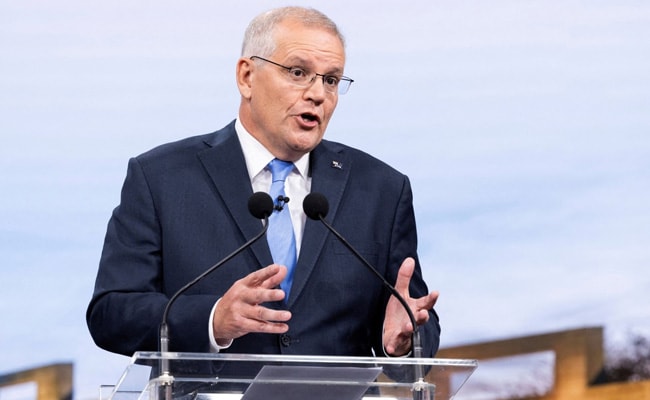Australia’s rightwing Coalition government has lost power after nearly a decade in office, with Saturday’s election showing a sharp shift to progressive parties that will see a Labor administration formed – possibly with the support of climate-focussed independents or Greens.
Within hours of polls closing, multiple election analysts said it was clear the ruling Coalition – led by Scott Morrison’s conservative Liberal party and the rural-based National party – could not retain the 76 seats it held, which is the minimum required to form a parliamentary majority.
Just before 11 pm on Saturday, Morrison conceded defeat and announced he would step down as leader of his party.
“We’ve seen a great deal of disruption in our own politics as the people have voted today with major parties having one of the lowest primary votes we’ve ever seen,” Morrison told supporters at his election night reception in Sydney.
“I know about the upheaval that’s taking place in our nation. And I think it is important for our nation to heal and to move forward,” Morrison said.
The Labor opposition outperformed the Coalition, but by Saturday evening, it was not apparent it could win a majority of seats to claim victory – which would have been its first at an election since 2007.
Morrison and Albanese offer last election pitch to voters before casting their votes – video.
Labor leader Anthony Albanese is seen as being the most likely to be able to form a government, with results after four hours of vote counting indicating he could need the support of independent or minor party MPs to reach a majority.
The biggest surprise of the election was the surge in support for the Greens party. By Saturday evening, the party – which has struggled to win more than the one seat it first picked up more than a decade ago – was on track to win as many as three different hearts, all focussed in progressive areas of Brisbane.

While both major parties were at pains throughout the campaign not to appear overly ambitious on climate action, the legacy of recent natural disasters across several states, including deadly bushfires and floods, resonated with inner-city voters.
Morrison’s Coalition appeared to have lost several seats to the “teal independents” – candidates running in traditionally safe Liberal party seats on a strong climate action platform, some backed by substantial funds from the Climate 200 organization.
Many adopted the teal color, nodding to the traditional Liberal blue and their green credentials, and performed well in seats in affluent parts of Melbourne and Sydney.
Early results indicated the independent teal movement could have taken as many as five seats from the government. If their leads firm up, it would mean a decimation of the moderate faction of the Liberal party.
Liberal losses to these independents include prominent government MPs, including the country’s treasurer, Josh Frydenberg, who appeared to have lost his wealthy Melbourne seat of Kooyong to independent Zoe Daniels, a former journalist.
During the campaign, several of those facing challenges from these MPs warned party supporters frustrated with the Liberal party’s position on climate that their ousting would only shift the party further to the right.
Rather than shift policy to appeal to moderate Liberals concerned about climate, Morrison was seen to focus on voters in outer metropolitan, regional, and mining seats, some former Labor strongholds, others held by the Nationals.
Albanese, who made much of his upbringing as the child of a single mother in Sydney public housing throughout the campaign, is a party stalwart from Labor’s left faction, although far from a radical firebrand.
A near-fatal car crash near his home last year made him refocus his life, he says, and he has since made a point of his healthier diet and lifestyle while acceding to superficial image changes.
But he has struggled to inject inspiration into Labor’s campaign, which has kept its policy offering to a minimum after the ambitious program of his predecessor, Bill Shorten, was effectively torn down by Morrison at the 2019 election.
Following six grueling weeks on the hustings, both leaders began election day with a last-minute campaign stop in marginal seats in Melbourne before they flew to Sydney to vote in the electorates they represent.











